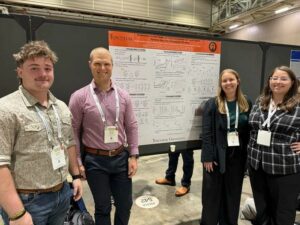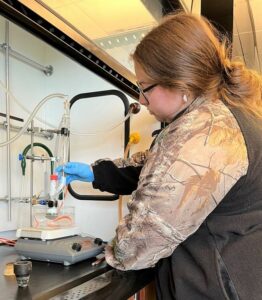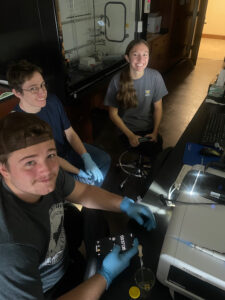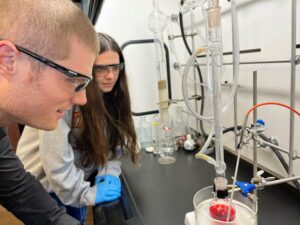GREENEVILLE – Research by undergraduate chemistry and biology students at Tusculum University continues to impact the global fight against cancer with an article published in a prestigious professional journal.

Left to right, Konrad Sehler, Dr. Dennis Ashford, Keylon Reynolds and Skylar Lane present a poster on the anti-cancer drug research project at the American Chemical Society conference in New Orleans earlier this year.
The article for “Inorganic Chemistry” details the group’s ongoing research into potential new medications to treat cancer, a subject science students have examined now for five years. Already posted online, the article will be published in the next print edition. Four students and four alumni, along with Dr. Dennis Ashford, the professor overseeing the project, are the authors.
“This is a tremendous accomplishment for our students and exemplifies how Tusculum prepares them to be career-ready professionals through active and experiential learning,” said Dr. Ashford, associate professor of chemistry. “It obviously benefits us by showing the quality of the research we conduct at Tusculum, but it also helps the broader scientific community by sharing our discoveries in this paper. It advances the field of these anti-cancer medications by contributing to the knowledge base among scientists as all of us seek enhanced methods to support patients.”
Students Ireland Cavanaugh, Skylar Lane, Keylon Reynolds and Konrad Sehler as well as alumni Andrew Medeck, Averie Price, Faith Robinette and Nathaniel Valentine are the student authors in the “Inorganic Chemistry” article. The alumni worked on the cancer project when they were Tusculum students.
Dr. Ashford submitted the article to “Inorganic Chemistry” for consideration, and the journal sent it to peer reviewers, who are experts in that field. These reviewers examine the data and conclusions in the article and confirm those items are properly supported. The experts then determine whether it meets the quality standards of “Inorganic Chemistry.”
“For the peer-reviewed journals, that means that a panel of experts in the field concludes that the work we have produced is impactful and we have thoroughly supported all of our conclusions with data that we have collected here with undergraduate researchers,” Dr. Ashford said. “To be published in a journal is important because the way scientists, professors, students and researchers are measured is essentially their publication records. That is the way we demonstrate our research capabilities.”

Skylar Lane works on the anti-cancer drug research project in a lab at the Meen Center on campus.
Since 2018, about 30 students have participated in the cancer medication research project, and they have created 20 compounds for testing and analysis. They are looking at possible medications that can be activated by light to kill cancerous cells. This method produces much less severe side effects by distributing the medication solely to the part of the body that has cancer.
A few years ago, students and Dr. Ashford discovered an interplay between light absorption in the therapeutic window and anti-cancer activity based on very minor structural changes in the compounds. This was a major finding in the research of the type of medication Tusculum is examining and was the subject of another paper, which was published in “Dalton Transactions” in 2022.
The article in “Inorganic Chemistry” is an extension of the “Dalton Transactions” paper by incorporating additional findings from the students and Dr. Ashford.
“We’re essentially working on the third generation of these complexes,” Dr. Ashford said. “The paper in ‘Dalton Transactions’ discussed the first generation of compounds. We took what we learned and applied them to the second generation, which is the subject matter of the article in ‘Inorganic Chemistry.’ Now, we’re taking what we learned from the second generation and incorporating them into the development of the third generation, which we started this semester.”
“Inorganic Chemistry” is a journal of the American Chemical Society, the largest scientific organization in the world. “Dalton Transactions” is a publication of the Royal Society of Chemistry, which is based in London. Being published in these journals will be helpful for Dr. Ashford and the students if they pursue grants or other funding for this project.
The students spend about five hours a week during the fall and spring semesters conducting research on the cancer project in one of the state-of-the-art labs in the university’s Meen Center. Through funding Dr. Ashford has obtained, some students have also worked on the initiative full time during the summer.

Left to right, Konrad Sehler, Andrew Medeck and Averie Price work on the anti-cancer drug research project.
Sehler and Reynolds, as well as fellow student Skylar Lane, presented a poster about the cancer research at the American Chemical Society conference in New Orleans earlier this year. Sehler is pleased his research has now been published.
“It’s really cool and super validating,” he said. “When you are an undergraduate and conducting research, you see others doing all of this neat stuff and you wonder whether you are doing something cool. Am I actually furthering science and expanding knowledge? Getting accepted into a prestigious journal like ‘Inorganic Chemistry’ is neat.”
Sehler is graduating in May with a bachelor’s degree in chemistry in May and will then pursue his doctorate in that field at Florida State University. Being published while at Tusculum has given him a huge confidence boost that he will be successful in the doctoral program. Working on the cancer research gave him the technical skills and ability to think through matters differently than one would in a classroom setting, and that strength is what graduate schools want, he said.
Reynolds said being published in these journals is major because it encompasses the work by multiple students, with each group passing on their research to the next group of students who follow. She is also handing off her work to the Pioneers who will follow her as she graduates in May and heads to the University of Alabama-Birmingham School of Optometry.
“It’s a pretty big accomplishment for me because I’m a biology major and I didn’t think I would be doing chemistry research,” said Reynolds, who was part of the summer team in 2023 in addition to working on the project during the academic year. “When I first started this project, it was way over my head. The fact that I’m now a published author in ‘Inorganic Chemistry’ is a pretty cool deal to me. Being published is something I can take with me forever.”
Dr. Ashford said people should recognize the caliber of research taking place at Tusculum.

Dr. Dennis Ashford, left, and alumna Faith Robinette work on the anti-cancer drug project when she was a student.
“It’s important to emphasize to the community and the students that the work that is happening at Tusculum is world-class research,” Dr. Ashford said. “We’re publishing in the same journals as people from the best research universities in the world, and we are doing it with undergraduate students.”
Dr. Heather Henson-Ramsey, dean of Tusculum’s College of Science, Technology and Mathematics, was thrilled with the newest development in the cancer research project.
“We are extraordinarily proud of our students and Dr. Ashford and the results they have achieved,” she said. “Dr. Ashford has provided students with an outstanding project that not only enhances their skills and knowledge but contributes to the health and well-being of our society. This initiative is an outstanding example of civic engagement and represents the value of a Tusculum education.”
To access the “Inorganic Chemistry” article, please visit bit.ly/3y1M5Dq. The “Dalton Transactions” article is available at bit.ly/3JK7a7X. Additional information about the cancer research project is available at https://site.tusculum.edu/anti-cancer-drugs-research/. To learn more about the university, please visit www.tusculum.edu.


